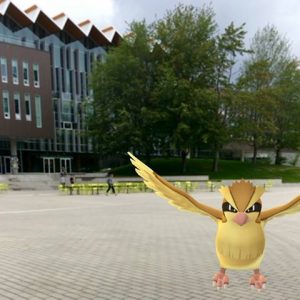

Dr. Craig Chapman completed both his BSc in Cognitive Science and a Killam Post-doctoral fellowship in the Department of Psychology, UBC. He’s now an Assistant Professor at the Neuroscience and Mental Health Institute at the University of Alberta where he leads the Action in Complex Environments Laboratory. His lab explores how the way we interact with our world fundamentally shapes the way our brain processes information.


The Kenny Building is a “PokéStop” in the Pokémon Go app.
“We are hardwired to act on real objects in the real world—not pictures of objects on a computer screen. This is one of the reasons I think Pokémon Go is so compelling—it puts the game experience in the real world, in the same physical space as your body. As rapid advances are made in augmented reality (AR) and immersive virtual reality (VR) we are in some ways returning our brain to a more natural state—we evolved to make efficient and effective movements in actual 3D space. In my opinion, we are on the brink of an explosion of AR and VR into all aspects of life—gaming and beyond. This will present some very interesting challenges and opportunities not just for game designers and the technology industry but also for neuroscientists like me interested in researching how the brain and body respond to real versus authentic versus clearly simulated worlds.”
Craig’s brother Ryan Chapman also graduated from UBC, but with a BASc in Engineering Physics and MSc in Computer Science. He’s now the CEO of Vancouver-based tech firm Motive.io.
“Building Location-Based AR games presents a host of challenges and opportunities that are very different from what you face in traditional game development. Pokémon Go works so well because it embraces the power of the genre while remaining aware of its limitations. The game naturally fits in the real world. The core mechanic is simple, making it easy to play even on a crowded street corner. It places you physically near other people sharing the same experience, which offers social engagement that no virtual environment can match.
At RocketChicken Interactive Inc. and Motive.io we’ve been passionate about the potential in AR gaming for a long time. Today’s phone is an astonishing device—it’s a supercomputer full of real-time sensors and a full-time connection to an unfathomable repository of information–but most mobile games box themselves into a small screen and ignore the rest. The genre needed a breakout hit to turn the industry’s head. I’m absolutely thrilled to see the reception that Pokémon Go has gotten, it’s exceeded even our most optimistic projections. Combined with the recent astonishing leaps in VR and AR hardware, I believe we’re in the early stages of a computing and entertainment revolution that may be unrivaled.”
This story was originally posted on UBC’s Facebook page.


